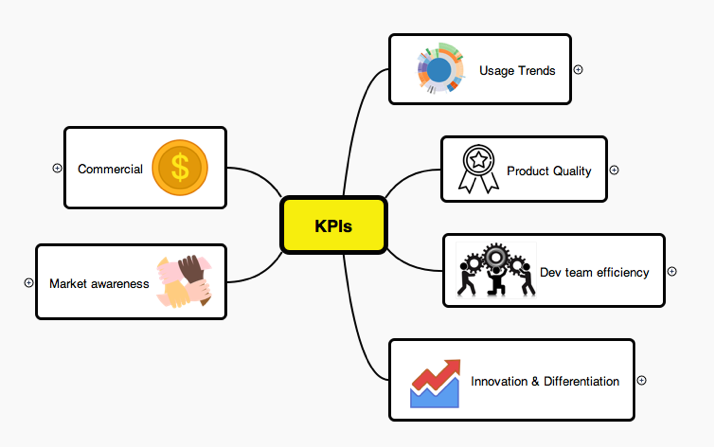With some amount of planning, experience, and training, becoming a product manager is easy. However, becoming a high-performing product manager that is an asset to the organization is something that is the necessity in the current age.
According to a McKinsey report, the demand and market for product managers are increasing, and the competition is slated to heat up. Thus, you would want to stand out from all the noise and get noticed by big enterprises.
Further, if you wish to earn well as a product manager, you need to display your skills and capabilities as an efficient product manager who is worth their salt. So how do you achieve that? How can you convince recruiters that you are the perfect candidate for the role?
You can start by understanding how the performance of a product manager is measured and using it to build your claim. So let’s take a look at what defines the success of a product manager:
Performance Metrics of a Product Manager
Here are some of the leading key performance indicators (KPIs) that define a product manager’s capabilities:
- Business Performance KPIs
Naturally, the first place to start would be to define the performance indicators that are a reflection of the product performance. These KPIs emphasize upon the customer experience, sales, revenue, profitability, and customer lifecycle. Investors use these KPIs to determine whether a project is worth their money or otherwise.
Thus, it is crucial for the product manager to work in accordance with these KPIs and deliver upon them. Following is the list of a few popular business performance KPIs:
- Revenue: Business revenue is an account of the cash flow and balance sheet that defines the success of the product. It could be in the form of monthly subscriptions, or the dollars raked in against sales. Apart from monetary metrics, bookings are also a strong indicator of the performance of the product and product manager.
- Number of Customers: A product manager must display competence in assessing the market condition and calculating an accurate total addressable market for the product. A reflection of these skills would be in the form of the customer lifecycle, customer lifetime value, retention, churn, and attrition.
- Time to Revenue: As a product manager, you have to launch your product at the most opportune moment to ride on the wave of its success. Thus, there is a possibility of developing the product in a time crunch or as per a non-negotiable timeline. Thus, the time to market and time to revenue is an indicator of their velocity and managerial skills.
- Market Position: After the product release, the feedback collected through customer reviews and third-party ratings and reports will reflect the product manager’s competence. It also highlights their ability to place their product at an agreeable position in the market.
- Product Usage KPIs
In addition to the product launch and customer reception, one needs to monitor the functionality of the product to assess the efforts put in by the product manager to make it user-friendly. Here are a few KPIs to measure the product usage trends:
- Number of Users: The total number of customers using the product versus the total addressable market, as calculated by the Product Manager, is a snapshot of the expected performance and delivered results. While they will not necessarily match, any great diversion from the trajectory could indicate a deep underlying problem with the product.
- New Users per Feature: The role of a product manager also includes their ability to collect customer feedback and make improvements to the product. As a result, if the release of a new feature manages to attract a wider audience, it is an indicator of the skills and abilities of the product manager.
- Product Development KPIs
Product development is the primary goal of any product manager. Thus, failure to achieve product development goals is a major issue that may render a candidate unfit. In order to prove the worth of a product manager in this area, the following KPIs come to play:
- Time for Delivery: The product manager first creates a roadmap for product development and tracks the progress against it. These timelines also include room for testing and development. Thus, sticking to these estimates indicates their analytical skills and ability to manage risks.
- Team Performance: A product manager will have to motivate their teams and keep them on track throughout the entire process of product development. Thus, the team’s spirits and performance could be a reflection of the product developer’s ability to maintain productivity, efficient resource allocation, and time-bound action.
- Support Tickets: Support tickets and escalations may be a sign of an underlying issue with the product. Thus, it shows that merely releasing a product on time is not the only priority, but adherence to product quality is also imperative.
- Soft Skills KPIs
In addition to all the above KPIs, there are a few other qualitative characteristics to measure the performance of a product manager. These KPIs are:
- Communication: Communication is the foundation of product development. Whether it is for pep-talk to team members or pitching to stakeholders – product managers will have to be the main evangelists for their products.
- Sales and Marketing: Even though it is a highly specialized task, a product manager is required to participate in sales and marketing strategy formulation to help the product reach new levels.
Finally, A Product Manager is Not Their Product
One may think that assessing the success of the product is the primary way to size up a product manager. However, as we may have seen from above, there is a lot that comes to play.
The failure of a product could also be due to poor programmers or sub-par marketers! A product manager simply tries to make the best of available resources and capitalize on them. Thus, evaluating their skills only on the basis of sales or revenue would not be a fair assessment.
The above KPIs will grant companies a holistic approach while addressing their product requirements and measuring their product manager performance. It will also help them decide if a candidate should receive an average product manager salary.

